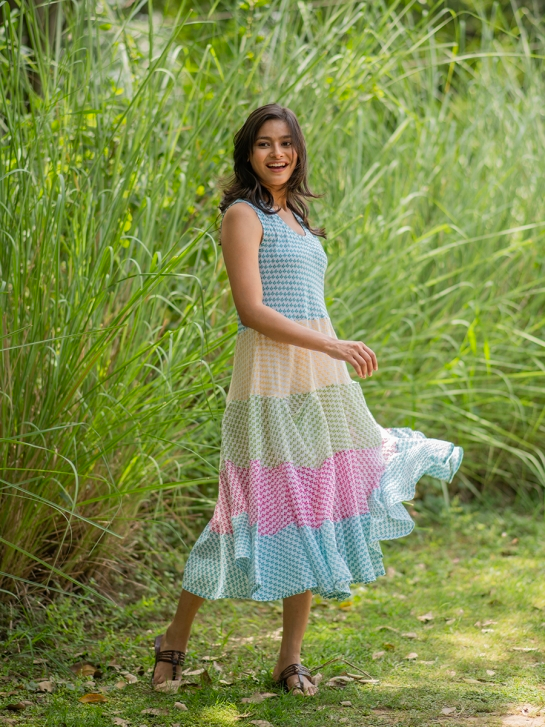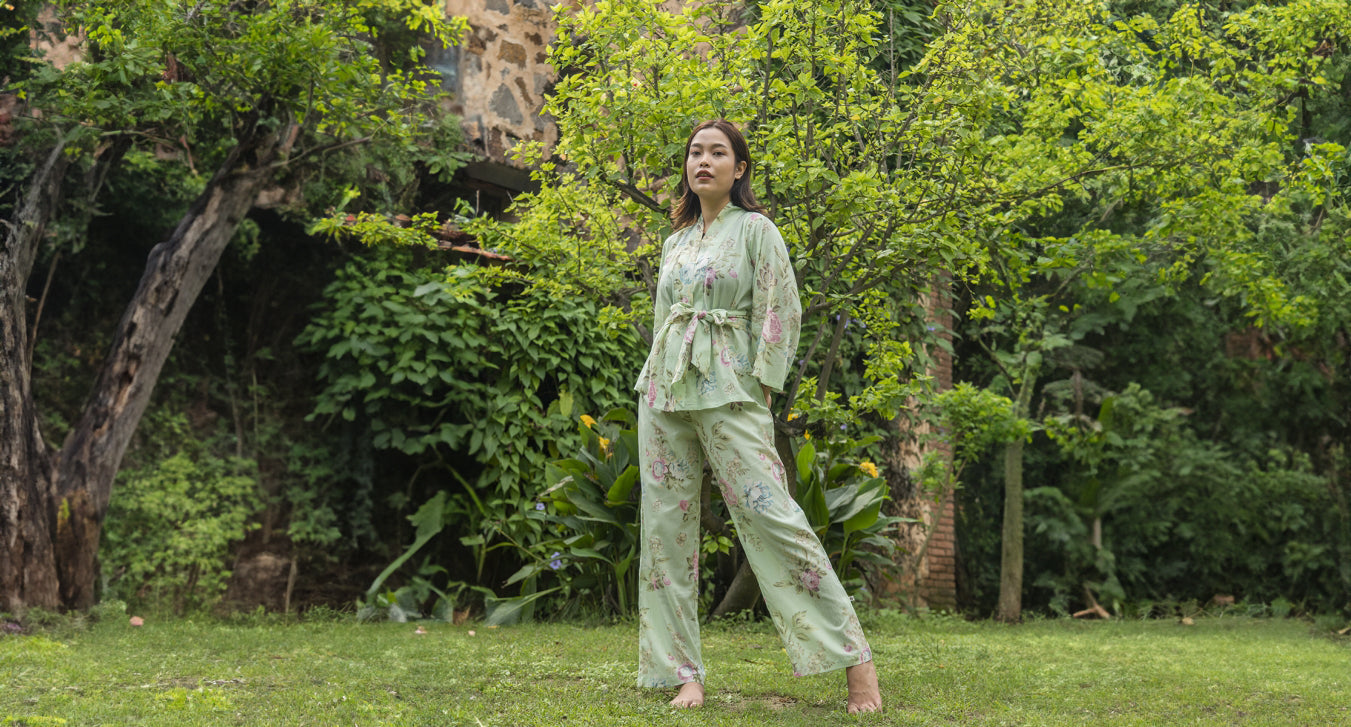

Welcome to the Shop !
We will send you an email to reset your password


We will send you an email to reset your password
Aishwarya Kumar, the passionate creative head behind the homegrown label “The Shop”. Strongly believes that the health or our planet in an increasing matter of concern. Established in 1969. The Shop has been able create a legacy of creating the finest ensembles using traditional Indian textiles and craftsmanship.” Our passion lies in reviving craft communities by integrating contemporary design with the expert workmanship of traditional craft. We offer an alternate to the mass produced. Low quality products that have saturated marketplaces. Our designs and ethos draw inspiration from hand crafted textile-an awakening of traditional art. An observance of Individuality and the realization of living I a sacred space,” she said. With the earth’s environment under severe stress. Sustainability and social responsibility have become the core values for Kumar and her work. This socially canciones brand uses ecologically sustainable production techniques like solar heating. Rainwater harvesting. And treating all effluents produced by their production processes. “We make use of a natural gas boiler and use the to dry all our fabrics. Our renew projects of cushions. Patchwork and bag collection have been designed by recycling leftover fabric scraps and are a commitment towards a more sustainable future.” Said Kumar. ARTICLE LINK
The Shop was started in 1969 by Delhi-based Preminder Singh and Kamal Singh, making it a family business. The Shop, which has three outlets in Delhi also has a store in Bengaluru, on State Bank of India roads, just off Museum Road. The Shop turns 50 this year. To celebrate that milestone and as an ode to summer, there is a two-day sale, the MalMal Mela. Clothes, home linen, stoles, bags, dresses, and more will be displayed at this exhibition. “Our specialty is that the clothes are soft, smooth textured light and skin-friendly. They are perfect for the summer,” says Kabir. The USP of The Shop is that it offers hand-crafted textiles and the company has also been involved for year “in reviving crafts by integrating contemporary ary design with the expert workmanship of traditional crafts”. The Shop also reaches out to craftsmen across the country to “blend style and create something unique explain Aishwarya Kumar who takes care of the design aspect. Kabir adds the company has become “older, wiser and compassionate about products, crafts people and their needs. we also focus on sustainability and social responsibility since we believe in upcycling too.” There will be summer dresses, nightwear, tops, trousers, men’s wear, bed linen, table linen, clothing, stoles, bags and more. The techniques used in their designs are dyeing, printing, quilting, applique, and hand and Machin embroidery to name a few. Some of the techniques used in the fashioning of their product are screen printing, block printing surface embellishment, machine and hand embroidery, applique and patchwork. ARTICLE LINK
A whimsical shop called, well, The Shop, and probably the capital's first ‘boutique’, is 50 years old and all grown up, writes Amrita Singh. Two years shy of 80, Preminder Singh of The Shop in Delhi’s Connaught Place looks dapper. Sporting a light-pink Sikh turban, a colorful striped-knit over a pale blue shirt, jeans and tan leather boots, Singh’s fashion choices add youthfulness to his white—bearded visage. Pami Singh, as he is better known, is the grandson of Sir Sobha Singh, often remembered as adhi dilli ka maalik “owner of half of Delhi”). Sobha Singh played a significant role in the making of modern Delhi, having report-edly bought large lots of land for as little as 2 per square yard. He moved to Delhi as a 22-year-old in 1911 with his contractor father, Sujan Singh. The two then constructed a raft of well-known buildings including Connaught Place, the National Museum, Baroda House and, of course, Sujan Singh Park, the modest abode of Delhi’s well-read legacy elite. Sobha’s son, writer Khushwant Singh, breathed his last in Sujan Singh Park’s red-brick apartments. This is where Pami Singh resides as well. Other than running The Shop, Singh is in charge of The Sobha Singh Trust.The Shop, in Regal Building, turned 50 this year. For an estab-lishment that is probably Delhi's first “lifestyle boutique”, it would have been appropriate that its backstory be dramatic. Its neighbor, The Cellar, also a property of the extended Singh family, is touted as being India’s first discotheque, the place where baby boomers let their hair down in the ’70s. It gave up the ghost over a decade ago, and is now ensconced in the Delhi-that-was canon. Likewise, the neighboring A Godin and Sons, a store that sold Western musical instruments. While the once pristine-white Regal Building stands dilapidated, The Shop continues apace, a valuable artefact in a crumbling museum. The Shop was birthed when Singh and his wife were furnishing their home as newlyweds. “Nothing appealed to us. It was all too ethnic,” recalls Singh. The couple was heavily influenced by Scandinavian design in general and Illums Bolighus, a store in Copenhagen that is considered a temple of modern design, in particular. What the Singhs wanted was a mix of traditional arts and crafts with a dash of contemporaneity. And they found it. The work of pioneering Indian modernists such as artist Satish Gujral and furniture designer Mini Boga found a place at The Shop.The Singhs virtually curated a new aesthetic that appealed to the Westernized Indian who also valued her country’s rich crafts traditions. Blown glass from Firozabad, aari embroidery from Sohna in Gujarat and kalamkari from Machilipatnam in Andhra Pradesh all made it to The Shop, sold domestically in 1969 and for export in 1971. A lot has changed in 50 years. From being a single store in Delhi, The Shop is now in Bengaluru, Mumbai, Kolkata, Coonoor, and Noida, as well as in South Delhi’s Meharchand Market. Pop-up stores in Frankfurt and Paris as a part of trade fairs are also an annual ritual. This growth owes to a generational shift: Kabir Singh, Pami’s son, and his wife Aishwarya Kumar, have put The Shop on the Indian map. The Shop had its main manufacturing unit in Noida from the ’80s. Before that, even the area behind the screen at Regal Theatre served as a manufacturing unit. But in the last three years, the Noida factory has expanded by 10,000 square yards, housing a Blue Tokai café, an amphitheater, and, of course, a store.To celebrate 50 years, The Shop now offers karkhana (factory) tours every Wednesday and Saturday (11.30 pm-12.30 am). With about 200 workers, the brightly lit factory doesn’t produce the usual soul-killing mechanical noises. Instead, it celebrates the imperfect craft of handmade products with sunlight and good cheer.Sitting in an office that features mud walls and khus curtains, Singh and Kumar outline The Shop’s future. The concept store in Noida will become a zero-waste facility in the coming years, with an effluent treatment plant. Even now, scraps of cloth or pieces of rejected designs are turned into bags and other accessories for sale (excellent cloth coasters!) in stores such as USA’s Bloomingdales and VNA Thrift stores.During Delhi’s anti-Sikh violence of 1984, Pami Singh says that when a mob gathered around The Shop, one of his workers said it belonged to him, thereby saving his employer and The Shop. The Noida factory was likewise protected by workers who said it belonged to Pami Singh’s sister-in-law, a Yugoslavian. Few businesses can boast a history this rich and a future that promises to be sustainable.